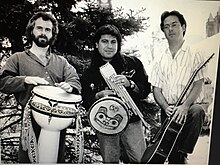Dario Domingues
Dario Domingues (born 1954 in Neuquén , Patagonia , Argentina; died April 16, 2000 in Ottawa , Canada) was an indigenous musician (also composer and singer) from Argentina . He chose Canada as his second home at a young age , but won over audiences and critics in Europe, especially in Germany, with his flute playing and the use of numerous percussion instruments . He made world music long before this genre emerged.
biography
Domingues was born in 1954 in Neuquén, Patagonia / Argentina, the son of a Mapuche Indian woman and an immigrant Italian. As a teenager, he made some money as a shepherd for six years. The Limay River flows through the area where he tended the sheep ; In his first album, “Azul Limay”, he expresses his longing for the old lost homeland. It was only at the age of 20 that he discovered music and began teaching himself to play the flute in 1975. In 1976 he fled the Argentine military disguised as a puppeteer and finally came to Ottawa, his new home , via Mexico in 1977.
Domingues was a musical self-taught . In his first years as an immigrant , he earned part of his living as a street musician in Ottawa. He began with folk music from his home country with flutes, wind and percussion instruments. The folk singer Willie Dunn spotted him. Domingues can be heard as a flute player on Dunn's album The Pacific . He also accompanied Dunn on a tour of Germany. Since 1981 he has toured Europe regularly, especially Germany and Austria. Tours also took him through Canada, the USA, South America and Japan.
In 1987 he became a father and took five years off for his son Damian, whom he raised alone. In the late 1990s, Dario Domingues was brutally attacked and critically injured by two drunks. The release of his last album Los Vibrantes as well as tours had to be postponed for a long time. Los Vibrantes was released in autumn 1999 and then toured again through Germany and Austria. On April 16, 2000, Dario Domingues committed suicide at the age of 46.
Career
Domingues took influences from different cultures into his music. He was already making world music in the early 1980s . He sang his composed songs himself (mostly in Spanish) and used a wide range of popular flutes (some self-made) and percussion instruments as well as Afro-Brazilian percussion. In the late 1980s, for example. B. With his band at the time, Túpac Amaru , he brought an upbeat style of Afro-Brazilian music to the album Awaking in Rhythms .
His international career began in Germany, where he released his albums with Trikont , Westpark and plans ; his first two albums were awarded the German Record Critics' Prize (1981 and 1983). Due to his success, he was able to set up his own music studio in Ottawa. His music was not as popular in Canada as it was in Europe. However, he was an integral part of Ottawa's music community and also gave concerts there. He made his extensive private collection of musical instruments from Latin America available to the Museum of Civilization in Ottawa Hall.
Domingues also worked as a film musician for Cry from a Diary of a Métis Child (Alberta 1986), a documentary about the fate of Richard Cardinal, who committed suicide in 1984 at the age of 17, and for the German television production Dschungelburger . He can also be heard on the Eigelstein album Before the Flood , was on tour with Rüdiger Oppermann and was involved in productions by Eberhard Schoener .
Domingues created spherical sound images on the one hand, and combative songs on the other. In his songs “Los Unos y los Otros”, “Nube Blanca”, “Maria” and “Abre las Puertas” he addressed poverty, injustice and migration. In "Cuando llora la Tierra" or "Ill Rivers" he complained about the destruction of nature and the pollution and poisoning of rivers through ignorance and greed.
Another theme in his compositions are the indigenous cultures of America, including their threat and extinction, such as in “Lamento Janomami” or “The End of the Yahgans' Journey”. His album Under the Totems part one (1993) is dedicated to the natives of both Americas on the occasion of the UN declaration The Year of Human Rights for Aboriginal People Around the World (1993); On it is also a hymn to the Maya Quiché Rigoberta Menchú , which was awarded the 1992 Nobel Peace Prize.
Discography (selection)
- The End of the Yahgans' Journey (1981, also under the title: The journey of the Yahgan is over )
- Exodus South of Rio Grande (1983)
- Born in the Land of Wind (LP 1985 / CD 1994 + bonus tracks)
- Awaking in Rhythms (1987)
- Children of South America (1988)
- Sunset over the Cordilleras (1992)
- Under the Totems part one (1993)
- Maria (CD single 1994)
- Under the Totems part two (1995)
- Maya (instrumentals 1996)
- Los Vibrantes (1999)
Web links
- Biography (English)
- Dario Domingues. Obituary by Claus Biegert.
- Dario Domingues at Discogs (English)
- Dario Domingues in the Internet Movie Database (English)
| personal data | |
|---|---|
| SURNAME | Domingues, Dario |
| BRIEF DESCRIPTION | Argentine world music artist (vocals, flutes, songwriting) |
| DATE OF BIRTH | 1954 |
| PLACE OF BIRTH | Neuquén , Argentina |
| DATE OF DEATH | April 16, 2000 |
| Place of death | Ottawa , Canada |

